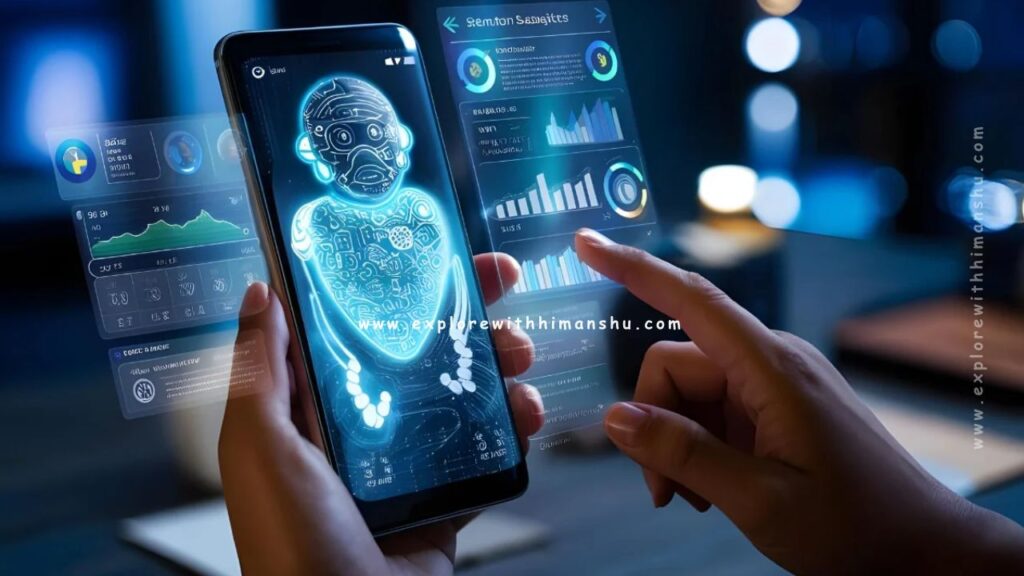Introduction :-
Today, in technology, AI or Artificial Intelligence is that game-changer, especially when considering mobile app development. Provision of enriched user experience through automation and data-driven decision-making to industries is how AI powered mobile applications are doing it. The highest ever demand for AI-driven solutions in mobile apps is currently being witnessed as businesses and developers deploy AIs into their mobile applications.
Discover how AI-powered mobile app development is revolutionizing innovation in 2025. Explore the latest AI tools, trends, and benefits driving the future of app creation.
Whether you’re a developer, entrepreneur, or a business owner, knowing the ways in which mobile applications can be improved through AI would keep you ahead in the competition. Read on to find how AI is changing mobile applications, the best AI-related functionalities, and how to develop an AI-based mobile app by 2025.

1. Why AI is Essential for Mobile App Development?
AI has become an integral part of mobile applications, enhancing user engagement and optimizing business processes. Here’s why AI is crucial for mobile app development:
If you know coding, you can develop AI-based mobile apps and earn money.
The rise of artificial intelligence (AI) has transformed mobile app development, making it more efficient and innovative. AI-powered apps can enhance user experiences and streamline business processes.
How to Get Started:
- How to Get Started:Learn AI and Machine Learning basics.
- Use AI development platforms like TensorFlow, OpenAI API, and Google AI.
- Build AI-integrated apps for industries like healthcare, finance, and e-commerce.
Monetization Strategies:
- Freemium Model: Offer basic features for free and charge for premium features.
- Subscription Model: Provide AI-driven services with monthly or yearly plans.
- Ad Revenue: Use Google AdMob or other ad networks to generate income.
Personalized User Experience
AI analyzes user behavior, preferences, and interactions to deliver customized recommendations, content, and notifications. Examples include:
- Spotify & Netflix: AI suggests music and movies based on user preferences.
- Amazon & eBay: AI recommends products based on purchase history and browsing patterns.
Smart Chatbots & Virtual Assistants
AI chatbots like Google Assistant, Siri, and Alexa enhance customer interactions by offering:
- 24/7 customer support with instant responses.
- Voice recognition capabilities for hands-free assistance.
- Predictive text responses for improved communication.
Advanced Image & Voice Recognition
AI-driven image and voice recognition systems allow apps to:
- Identify objects, faces, and text using computer vision.
- Enhance security through biometric authentication (Face ID, fingerprint recognition).
- Improve accessibility for visually impaired users.
Predictive Analytics & Data-Driven Insights
AI-powered analytics help businesses make informed decisions by analyzing customer behavior, sales trends, and app usage data. Benefits include:
- Optimized marketing strategies with AI-driven insights.
- Improved business operations through predictive maintenance.
- Personalized push notifications based on user interests.
2. Key AI Technologies Used in Mobile Apps
To build AI-integrated mobile applications, developers use advanced AI technologies, including:
Machine Learning (ML)
ML enables apps to learn from user interactions and improve performance over time. Examples include:
- Google Photos: Recognizes and categorizes images.
- Spotify: Recommends songs based on listening habits.
Natural Language Processing (NLP)
NLP allows apps to understand, interpret, and respond to human language. Common applications include:
- Chatbots & voice assistants for real-time communication.
- Translation apps like Google Translate.
Computer Vision
Computer vision helps mobile apps identify and process visual data. Examples include:
- Face recognition for security (Face ID).
- AR filters in Snapchat & Instagram.
AI-Powered Automation
Automation simplifies repetitive tasks, improving efficiency and accuracy. Common use cases include:
- Automated email sorting (Gmail’s Smart Reply).
- AI-powered content moderation in social media apps.

3. How to Develop an AI-Powered Mobile App in 2025
Building an AI-driven app requires careful planning and the right tools. Follow these steps:
Step 1: Define Your App’s Purpose & Features
- Identify the problem your app will solve.
- Determine which AI features to integrate (chatbots, predictive analytics, voice recognition, etc.).
Step 2: Choose the Right AI Tools & Platforms
Use AI development platforms such as:
- Google AI & TensorFlow for machine learning.
- Open AI API for chatbot and language processing.
- IBM Watson AI for AI-powered insights.
Step 3: Design an Intuitive User Interface (UI/UX)
- Ensure seamless navigation for a user-friendly experience.
- Use AI-driven design tools like Adobe Sensei.
Step 4: Train Your AI Model with Quality Data
- Collect and process relevant data for training.
- Use AI datasets and machine learning algorithms for model training.
Step 5: Develop & Test Your AI Features
- Implement AI functionalities using SDKs and APIs.
- Conduct A/B testing to optimize app performance.
Step 6: Launch & Optimize
- Deploy your app on Google Play Store & Apple App Store.
- Continuously update the AI model based on user feedback.
👉 Check Out the Latest Deals on Amazon
4. Best AI-Powered Mobile App Ideas for 2025
If you’re looking for AI-powered app ideas, here are some high-demand business opportunities:
AI-Based Health & Fitness Apps
- AI-powered fitness coaches provide personalized workout plans.
- Smart diet trackers analyze eating habits and suggest meal plans.
AI-Powered E-Learning Apps
- AI tutors adapt courses based on students’ learning styles.
- Automated assessment tools provide instant feedback.
AI-Driven Finance & Investment Apps
- AI trading bots analyze stock market trends.
- Personal finance assistants track expenses and offer savings suggestions.
AI in E-commerce Apps
- Virtual shopping assistants recommend products based on preferences.
- AI chatbots handle customer inquiries and suggest personalized deals.
AI-Powered Travel & Navigation Apps
- AI travel planners provide personalized itinerary recommendations.
- Smart navigation apps predict traffic conditions and suggest optimal routes.
Affiliate Marketing 2025: How To Make Money Online ?

5. Monetization Strategies for AI-Powered Mobile Apps
If you’re building an AI-driven app, here are some profitable monetization strategies:
Subscription-Based Model
- Charge a monthly or yearly fee for premium features.
- Popular in AI-driven productivity and fitness apps.
Freemium Model
- Offer a free version with basic AI features.
- Charge for premium upgrades (e.g., AI-powered recommendations).
In-App Advertisements
- Partner with advertisers and brands.
- Use Google AdMob & Facebook Ads for revenue generation.
AI-Powered Services for Businesses
- Offer AI-powered solutions like chatbots, data analytics, and automation.
- Target industries such as healthcare, e-commerce, and finance.
Conclusion: AI Powered Mobile App Development
AI-powered mobile applications are shaping the future of technology, business, and user experience. By integrating machine learning, NLP, and computer vision, developers can create innovative, efficient, and user-friendly applications.
AI-powered mobile app development is revolutionizing the tech industry, offering smarter, faster, and more efficient solutions for businesses and users alike. As we move further into 2025, AI continues to enhance app performance, user experience, and automation, making mobile applications more intelligent, interactive, and adaptive.
One of the biggest advantages of AI in app development is its ability to personalize user experiences. With AI-driven analytics, apps can analyze user behavior, preferences, and patterns to deliver highly customized content and recommendations. This leads to increased user engagement, retention, and satisfaction.
Additionally, AI is transforming app security and fraud detection. With advanced machine learning models, apps can identify suspicious activities, detect potential cyber threats, and enhance authentication processes. This ensures that users’ data remains secure and protected in an increasingly digital world.
What are your thoughts on AI-powered mobile app development? Do you think AI will redefine the future of apps? Share your views in the comments below! 🚀


